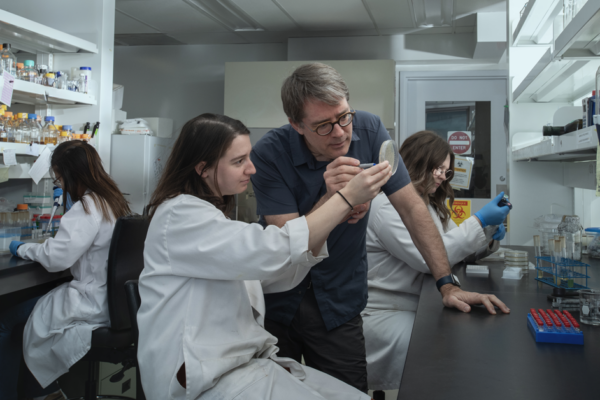- Academic Life
-
YOU ARE
- Community member
- Future Student
- Student
- Professor
- Alumni
- Media
- Guidance counsellors
- INRS retiree
- Contact Us
- Newsroom
- Careers
- FR
-
Studies
We teach the next generation of researchers to develop scientific, social, and technological innovations.
-
Research
We find solutions through interdisciplinary research and industry or public and community partnerships.
-
INRS
We play an active role in Québec's economic, social, and cultural development.
The doping control lab tasked withperforming analyses at the 2010 Winter Olympics has been accredited by the Standards Council of Canada. The accreditation certificate was presented today to lab director Christiane Ayotte, who also heads up the INRS Doping Control Laboratory, the only Canadian lab accredited by the World Antidoping Agency, and the second biggest of its kind in the world.
The accreditation, which reflects the lab’s stringent standards, was attended by Michel Girard, the Standards Council of Canada’s director of strategic relations and stakeholder engagement.; Jacques Girard, director of Bureau de normalisation du Québec; Daniel Coderre, director general of INRS; and Alain Fournier, director of the INRS–Institut Armand-Frappier Research Center.
“The satellite lab set up in Vancouver will benefit from the expertise developed by INRS and the progress it has made in the fight against doping. And, thanks to the collaboration of a number of industrial partners, it also boasts state-of-the-art equipment that will allow us to perform highly sophisticated analyses for the duration of the Games,” noted Christiane Ayotte.
The Standards Council of Canada (SCC) is delighted that its accreditation, attributed in collaboration with Bureau de normalisation du Québec (BNQ), will allow INRS–Institut Armand-Frappier to be onsite in Vancouver to provide topnotch service at the upcoming Olympics. BNQ supported the INRS bid for accreditation of its satellite doping control lab. The integrity of antidoping test results at the Olympic and Paralympic Games explains the importance of adhering to international standards and the value of accreditation.
“We are delighted to support the Olympic Committee’s goal of a doping-free games by accrediting the satellite lab in Richmond, BC. The SCC accreditation provides an additional assurance that the lab test results will be as accurate as possible. This is key in the fight against doping at the Olympic and Paralympic Games,” said SCC executive director John Walter.
This accreditation bears testament to the quality of the research and analysis techniques developed by Professor Christiane Ayotte’s team. “In addition to helping promote the work of INRS, the doping control laboratory illustrates the importance our university places on basic research and knowledge transfer in the field—two areas that are essential and inseparable in proposing innovative solutions to address today’s concerns,” said a delighted Daniel Coderre, director general of INRS.
The Standards Council of Canada (SCC) is a Crown Corporation and a portfolio of Industry Canada. With the goal of enhancing Canada’s economic competitiveness and social well-being, the SCC offers accreditation services to both standards development bodies, and conformity assessment organizations. In the area of conformity assessment, it provides services to over 400 clients, including various testing and calibration laboratories. It’s accreditation programs are based on internationally recognized standards and guides.
The BNQ’s mission is to act as a partner to business, industry, and public and regulatory bodies for the purpose of improving the quality of products, processes and services, as well as their acceptance on all markets.
Share



